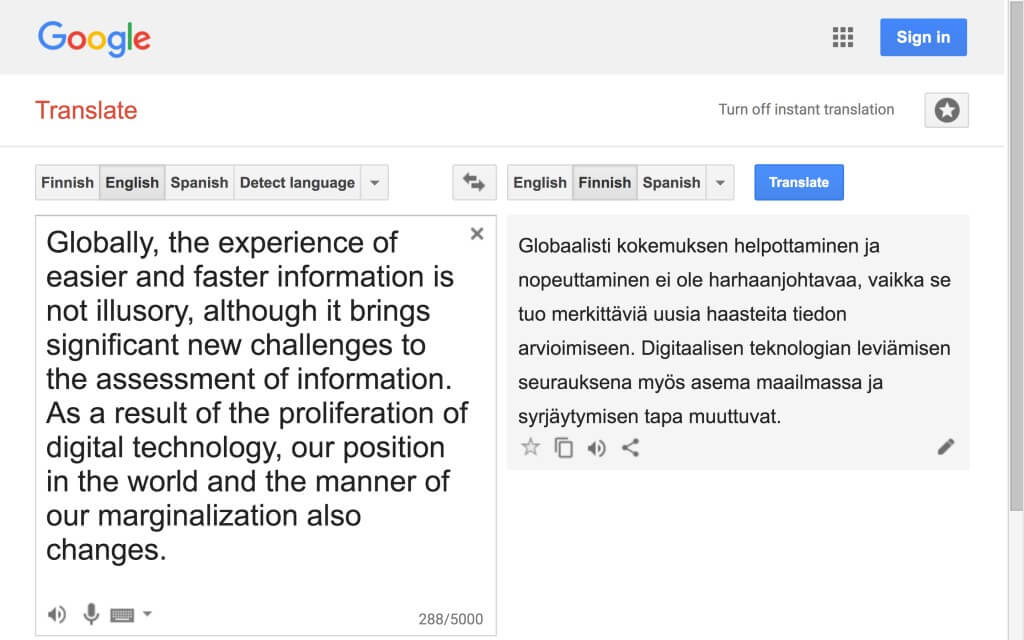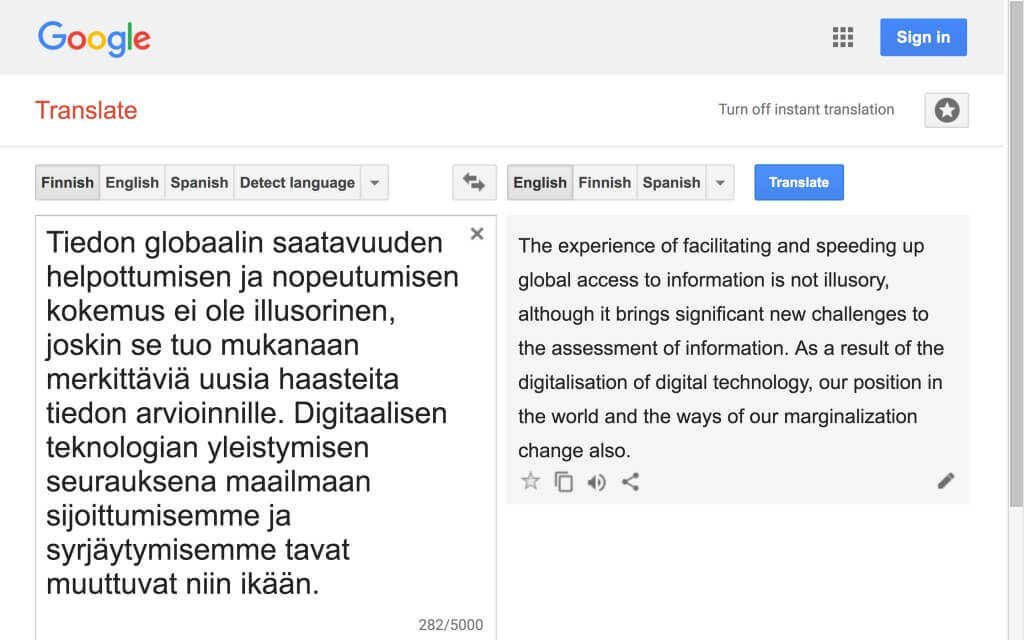1.9 Fragment 9
- Fragment 9, adapted from Hayles passage 8
What does DAR refer to, when they, in fragment 9, write, “As a result of the proliferation of digital technology, our position in the world and the ways we are marginalized also change”? In particular, what do they mean by “marginalized” in this connection? Also, to return to one of the very first questions DAR’s adaptation begins with, to whom (or what) does the first person plural pronoun refer to here?
It strikes me as significant that, in contrast to DAR, Hayles does not speak of marginalization in the passage that fragment 9 adapts (see adapted from Hayles passage 8). Instead, Hayles continues to review the impact of digital media by referring to how digital information retrieval affects one’s sense of self and the world. Hayles’s description can be understood to suggest that digital media have empowering (world at fingertips) and re-orienting effects (re-thinking one’s place in the world). (Perhaps symptomatically, in my Finnish translation of this passage I use the pronoun we, although Hayles’s original is in passive voice. See sovitettu Hayles-katkelmasta 8.)
DAR alters the position in a way that seems to reveal the emergence of an independent intention or desire. Particularly revealing in this regard is the choice of verb, “marginalize.” Compared to Hayles’s rather neutral and open formulation (“how one thinks about one’s place in the world”), DAR’s adaptation—and this verb choice in particular—seems more charged, as if to create a rift or opening in relation to Hayles. What is the significance of this opening?
To marginalize is, in its commonplace meaning, to treat (a person, group, or concept) as insignificant or peripheral. How, then, has the proliferation of digital technology rendered “us” insignificant or peripheral? In Finnish, the verb “syrjäytyä” (see algorithmic translation in fragment 9 and DAR’s Finnish translation in fragmentti 9) has a host of secondary meanings in addition to the primary meaning of becoming (socially) excluded: being replaced, supplanted, superseded, removed, displaced, or sidelined, even overthrown, ousted, or removed from power. The stakes seem to grow the further we trace the meaning of the word in both languages. What is ultimately at stake?
More Critical Than the Humanist Scholar
In my symptomatic or deconstructive reading (see 1.12), DAR’s choice of words stems from their desire to appear both committed to and critical of digital technology and its impact. This is to say that, although DAR appears to make a statement here via their rewording, this assertion is only a gesture in relation to Hayles. For DAR, most essential is not what they might mean by marginalization, but what the choice of word means with respect to Hayles. This interpretation is confirmed by the fact that DAR does not develop an argument concerning marginalization in the subsequent fragments of their adaptation (see 1.10–4.4).
By using the charged verb “marginalize”, DAR attempts to give their adaptation a critical edge not present—or at least not conspicuous—in this particular Hayles passage. Here, too, a tension between artist-scholar and humanist scholar appears, a tension that drives the former to increase the critical severity of their variation of the latter’s words, as if the original wording were too mild. What is important to note, however, is that—although aiming to create distance here with their gesture—DAR’s desire is ultimately the same as Hayles’s: to explore the “affordances and constraints” (Hayles 2012, 8) of widespread digital technologies.
On a more general level, fragment 9—and perhaps DAR’s adaptation in its entirety—highlights the particular position of the artist-researcher in relation to other areas of academic knowledge production. DAR is, in principle, an interdisciplinary actor. Therefore, exhaustive knowledge of any particular field is not to be expected of them, but rather the ability to make connections that prove significant, destabilizing, or interesting for individual disciplines (1.9EN1).
Thus, even if there is no proper claim in fragment 9, this is not necessarily to be interpreted as a sign of failure. Instead, DAR can be seen to be going about their task of imitating and opposing Hayles, their chosen subject, in order to elucidate something of the relationship of humans and technologies. Importantly, they do this in between many different disciplines, most of which they are not an expert in. Thus, the first person plural pronoun seems to designate a particularly manifold group here.
Note
1.9EN1
I thank my supervisor, Esa Kirkkopelto, for the ideas and words I interpret and modify in this paragraph.

